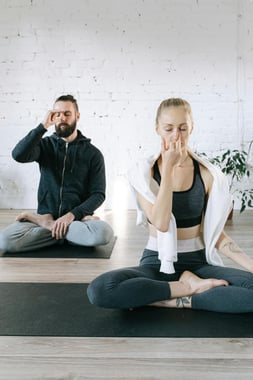Breathe Away Anxiety: Evidence-Based Techniques
Breathe Away Anxiety: Evidence-Based Techniques. Reduce anxiety with simple breathing exercises grounded in science.
Health Is Life
1/26/20251 min read
In moments of stress, our breath is one of the most powerful tools we can use to restore calm. Scientific research has shown that specific breathing techniques can help reduce anxiety, lower heart rate, and improve mental clarity. Here are three evidence-based breathing exercises to help you feel more grounded.
1. Box Breathing
How to do it:
Inhale deeply through your nose for 4 seconds.
Hold your breath for 4 seconds.
Exhale slowly for 4 seconds.
Hold again for 4 seconds before repeating.
Benefits: This method helps regulate the autonomic nervous system, promoting relaxation.
2. 4-7-8 Breathing
How to do it:
Inhale through your nose for 4 seconds.
Hold your breath for 7 seconds.
Exhale slowly through your mouth for 8 seconds.
Benefits: This technique reduces heart rate and encourages parasympathetic activity, helping to counteract stress responses.
3. Diaphragmatic Breathing (Belly Breathing)
How to do it:
Place one hand on your chest and another on your belly.
Inhale deeply through your nose, focusing on expanding your belly.
Exhale slowly through pursed lips.
Benefits: Diaphragmatic breathing enhances oxygen exchange and reduces cortisol levels.
Incorporating these simple breathing exercises into your daily routine can be a powerful way to manage anxiety and promote overall well-being. Practice them regularly and notice the difference they make in your mental and physical health.
Scientific Evidence:
Brown, R. P., & Gerbarg, P. L. (2005). "Sudarshan Kriya Yogic breathing in the treatment of stress, anxiety, and depression: Part II—Clinical applications and guidelines." Journal of Alternative and Complementary Medicine.
Jerath, R., Crawford, M. W., Barnes, V. A., & Harden, K. (2015). "Self-regulation of breathing as a primary treatment for anxiety." Applied Psychophysiology and Biofeedback.
Zaccaro, A., Piarulli, A., Laurino, M., et al. (2018). "How breath-control can change your life: A systematic review on psychophysiological correlates of slow breathing." Frontiers in Human Neuroscience.


